New York based new music collective counter)induction celebrates its 20th anniversary with an album that features premiere recordings of works written for the group by its member composers, Kyle Bartlett, Douglas Boyce, Jessica Meyer, and Ryan Streber. First recordings of Diego Tedesco's Scherzo, also written for the ensemble, and Alvin Singleton's rarely heard Ein Kleines Volksleid round out this album from an ensemble that has steadfastly held course over two decades, championing compositional craft and aesthetic integrity in their programming and performances.
| # | Audio | Title/Composer(s) | Performer(s) | Time |
|---|---|---|---|---|
| Total Time | 57:00 | |||
| 01 | The Hunt by Night | The Hunt by Night | Benjamin Fingland, clarinet, Caleb van der Swaagh, cello, Ning Yu, piano | 12:07 |
| 02 | Before | Before | Benjamin Fingland, clarinet, Caleb van der Swaagh, cello, Daniel Lippel, guitar | 8:23 |
| 03 | Ein Kleines Volkslied | Ein Kleines Volkslied | Benjamin Fingland, clarinet, Caleb van der Swaagh, cello, Daniel Lippel, guitar, Jeffrey Irving, vibraphone, Renate Rohlfing, piano, Randall Zigler, bass | 6:59 |
| 04 | Forgiveness | Forgiveness | Benjamin Fingland, clarinet and loop pedal | 8:49 |
| 05 | Piano Quartet | Piano Quartet | Miranda Cuckson, violin, Jessica Meyer, viola, Caleb van der Swaagh, cello, Ning Yu, piano | 12:19 |
| 06 | Scherzo | Scherzo | Miranda Cuckson, violin, Jessica Meyer, viola, Benjamin Fingland, clarinet, Caleb van der Swaagh, cello, Daniel Lippel, guitar | 8:23 |
Against Method celebrates a landmark anniversary for veteran New York new music ensemble counter)induction. Their two decades of musical life are a testament to their focused artistic vision, vibrancy of performances, and tenacity of spirit. This recording, featuring works by c)i’s member composers alongside music by two guests, captures the fundamental subversion at the core of the ensemble’s ethos -- the prioritization of substance over fashion, despite the existential pressures on a group of its kind in our contemporary landscape.
Douglas Boyce’s vigorous trio etude for clarinet, cello, and piano The Hunt by Night opens the program. Boyce writes that the piece, “is a modern caccia wherein the temporal orientations of the three musicians are bundled and re-bundled as the players shift roles from pursuer to pursued, from leader to outsider, from furious precision to savage confusion.” The virtuosity in this music is physical and mental, balancing the deft passagework with the vigilance needed to navigate the quickly shifting meters and shuffled motives.
A second trio, this time for bass clarinet, cello, and guitar, Kyle Bartlett’s Before is the expressive anthesis of the Boyce, swapping hardiness for delicate tactility and breadth of permutation for depth of examination. Bartlett’s music unfolds at the pace of an inner emotional dialogue, pausing when necessary to absorb the import of a certain expressive phrase, or digging in to an uncomfortable timbre to mine its essence. This balance between the poetic and visceral impulses binds together the sectional structure of Before.
Alvin Singleton’s Ein Kleines Volkslied was written for the Bang on a Can All-Stars in 1997 and is based on the Scottish folk song, “Annie Laurie.” Singleton establishes fixed vocabularies of musical material for each of the instruments in the sextet. The sparseness of the orchestration throughout much of the work gives way to density as Singleton merges the disparate threads together into a brief closing climax. The work’s gesture towards populism is subverted by an injection of complexity and abstraction. The balance between populism and modernism notwithstanding, the playful pun on Mozart in the title sets the tone for this lightly bittersweet piece.
Read MoreWritten for her husband Benjamin Fingland, Jessica Meyer’s Forgiveness captures the intimacy and intricacy of negotiating long term relationships. Using a looper pedal, Meyer begins with a range of breath sounds that merge with sustained melodic fragments. Bent notes and subtle ornaments enhance the expressive quality of the looped gestures as registral expansion opens up into a rich, modal texture.
Ryan Streber’s Piano Quartet engages reverently with its venerable instrumentation. A neoclassical strain underlies its shifts from a tranquil, harmonic haze to taut, contrapuntal episodes. The work is Haydnesque is its motivic economy -- developed from a short, six note melodic ideé fixe, Streber permeates the different characters of the work with this material, allowing it to drive the formal discourse. The dynamic interplay between the instruments alternates between interwoven passagework and ethereal suspensions, culminating in a rhapsodic climax.
Closing the program is Argentine composer Diego Tedesco’s Scherzo for clarinet, guitar, violin, viola, and cello, written for counter)induction in 2019. The “joke” of the piece is encapsulated in a simple descending chromatic scale, from which much of the melodic material for the work is drawn. Tedesco writes specific and colorful expression indications in the score -- “blues,” “burlesque,” “desolate” -- and his fluid, gestural writing allows the performers to inject the texture with these characters. The ensemble is sometimes treated as a hybrid unit and other times in subgroups, establishing interrelationships between the instruments and players that speak to the core of what is so unique and magical about chamber music.
And interrelationships are indeed at the heart of what counter)induction is about -- dialogue, both while making music as well as in the process of curation, is the driving force behind the ensemble. In this sense, counter)induction has always strived to be a microcosm of an idealized community, one in which consensus is arrived at through the free exchange of ideas and the delicate process of compromise. It is a formula that has helped the group endure for twenty years, and this celebration of that milestone is yet another manifestation of c)i’s commitment to its set of aesthetic principles.
– Dan Lippel
Recorded, mixed, and mastered by Ryan Streber, Oktaven Audio, Mt. Vernon West, NY (Session dates: Bartlett and Meyer: 6/19/20; Singleton 8/15/20; Tedesco: 6/18/19; Boyce: 2/1/2020; Streber: 11/13/19)
Executive Producer: counter)induction
Session producers: Ryan Streber (all tracks), Daniel Lippel (Piano Quartet), Douglas Boyce (Etude #3), Jessica Meyer (Forgiveness)
Editing producers: Ryan Streber (Piano Quartet, Etude #3, Forgiveness, Ein Kleines Volkslied), Jessica Meyer (Forgiveness), Daniel Lippel (Scherzo, Before, Ein Kleines Volkslied)
Design and Layout: Jessica Slaven
Cover image: Diego Tedesco
This album is funded in part by The Alice M. Ditson Fund and the recording of The Hunt by Night partially supported by a grant by George Washington University. Ein Kleines Volkslied was commissioned by Bang on a Can as part of the National series of works sponsored by Meet the Composer/Arts Endowment Commissioning Music/USA, with support from the Helen F. Whitaker Fund.
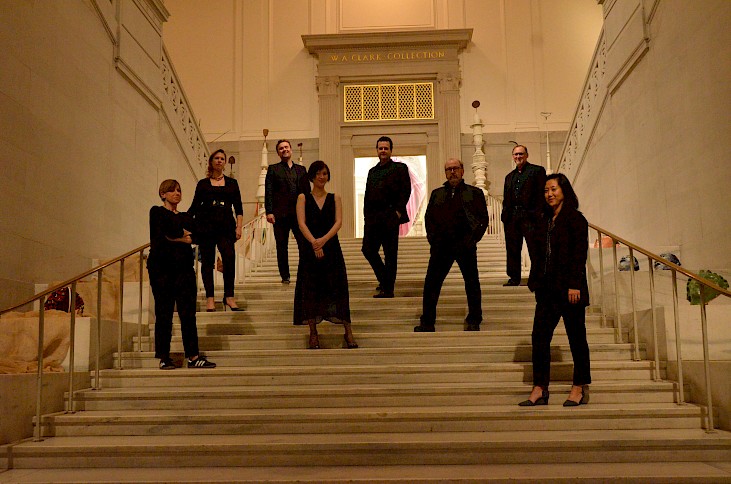
In its twenty years of virtuosic performances and daring programming, the composer/performer collective counter)induction has established itself as a force of excellence in contemporary music. Hailed by The New York Times for its “fiery ensemble virtuosity” and for its “first-rate performances” by The Washington Post, c)i has given critically-acclaimed performances at Miller Theatre, Merkin Concert Hall, the Philadelphia Chamber Music Society, Music at the Anthology, and the George Washington University. Since emerging in 1998 from a series of collaborations between composers at the University of Pennsylvania and performers at the Juilliard School, counter)induction has premiered numerous pieces by both established and emerging American composers; including Eric Moe, Suzanne Sorkin, Ursula Mamlok, and Lee Hyla. c)i has also widely promoted the music of international composers including Jukka Tiensuu, Gilbert Amy, Dai Fujikura, Diego Tedesco, and Elena Mendoza. Since its inception, c)i’s mission has been straightforward: world-class performances of contemporary chamber music, without hype and without agenda other than a complete commitment to the most compelling music of our day.
http://counterinduction.com/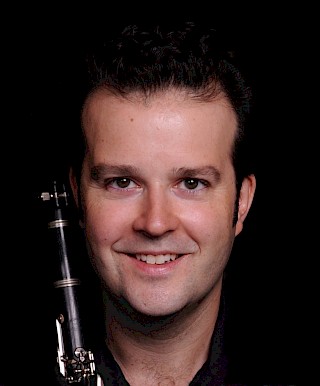 Benjamin Fingland interprets a diverse range of clarinet literature, with performances conveying “spiritedness and humor”, “unflagging precision and energy”, "eloquence and passion", "dazzling technique" (The New York Times) and playing described as “something magical” (The Boston Globe), “compellingly musical” (The New York Times) and “thoroughly lyrical…expert” (The Philadelphia Inquirer). A proponent of the music of our time, he works closely with living composers. In addition to being a founding member of the critically-acclaimed new music collective counter)induction, he plays with many leading contemporary performance ensembles: NOVUS NY, the International Contemporary Ensemble, the New York New Music Ensemble, the Network for New Music, the Argento Ensemble, the Locrian Chamber Players, and Sequitur. He is a member of the renowned Dorian Wind Quintet, which will soon celebrate 60 years of groundbreaking commissions and performances of wind chamber music. He has Bachelor and Master of Music degrees from the Juilliard School and is on the faculty of the Third Street Music School Settlement in New York City.
Benjamin Fingland interprets a diverse range of clarinet literature, with performances conveying “spiritedness and humor”, “unflagging precision and energy”, "eloquence and passion", "dazzling technique" (The New York Times) and playing described as “something magical” (The Boston Globe), “compellingly musical” (The New York Times) and “thoroughly lyrical…expert” (The Philadelphia Inquirer). A proponent of the music of our time, he works closely with living composers. In addition to being a founding member of the critically-acclaimed new music collective counter)induction, he plays with many leading contemporary performance ensembles: NOVUS NY, the International Contemporary Ensemble, the New York New Music Ensemble, the Network for New Music, the Argento Ensemble, the Locrian Chamber Players, and Sequitur. He is a member of the renowned Dorian Wind Quintet, which will soon celebrate 60 years of groundbreaking commissions and performances of wind chamber music. He has Bachelor and Master of Music degrees from the Juilliard School and is on the faculty of the Third Street Music School Settlement in New York City.
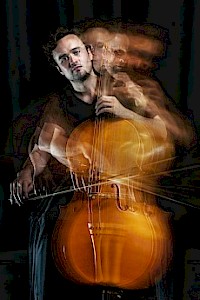 A versatile chamber musician and soloist, cellist Caleb van der Swaagh is an alumnus of Ensemble ACJW (now known as Ensemble Connect) – a program of Carnegie Hall, The Juilliard School, and the Weill Music Institute in partnership with the New York City Department of Education. Caleb is a first prize winner in the SAVVY Chamber Competition and is the recipient of the Manhattan School of Music Pablo Casals Award and the Tanglewood Karl Zeise Memorial Cello Prize and was also a grant recipient from the Virtu Foundation. As a chamber musician, Caleb has performed with the Borromeo String Quartet, The Knights, A Far Cry, and the Jupiter Symphony Chamber Players and has recently appeared at such festivals as the Chelsea Music Festival, Ottawa ChamberFest, Garth Newel Music Center, Music from Montauk, and Birdfoot Festival. Caleb’s most recent release is the Carter Clarinet Quintet with Phoenix Ensemble on Navona and he has also appeared on recordings on Albany Records, Bright Shiny Things, Supertrain Records, Linn Records, and Avie Records.
A versatile chamber musician and soloist, cellist Caleb van der Swaagh is an alumnus of Ensemble ACJW (now known as Ensemble Connect) – a program of Carnegie Hall, The Juilliard School, and the Weill Music Institute in partnership with the New York City Department of Education. Caleb is a first prize winner in the SAVVY Chamber Competition and is the recipient of the Manhattan School of Music Pablo Casals Award and the Tanglewood Karl Zeise Memorial Cello Prize and was also a grant recipient from the Virtu Foundation. As a chamber musician, Caleb has performed with the Borromeo String Quartet, The Knights, A Far Cry, and the Jupiter Symphony Chamber Players and has recently appeared at such festivals as the Chelsea Music Festival, Ottawa ChamberFest, Garth Newel Music Center, Music from Montauk, and Birdfoot Festival. Caleb’s most recent release is the Carter Clarinet Quintet with Phoenix Ensemble on Navona and he has also appeared on recordings on Albany Records, Bright Shiny Things, Supertrain Records, Linn Records, and Avie Records.
An advocate of contemporary music, Caleb is a member of counter)induction and Ensemble Échappé as well as performing with other leading new music ensembles. Among many others, Caleb has premiered works by such composers as Beat Furrer, Ted Hearne, Iancu Dumitrescu, Christian Wolff, Roscoe Mitchell, and Georg Friedrich Haas. He also regularly performs his own compositions and arrangements.
A native New Yorker, Caleb graduated magna cum laude from Columbia University as part of the Columbia – Juilliard Exchange program with a degree in Classics and Medieval & Renaissance Studies. Caleb received his master’s degree with academic honors from New England Conservatory and later studied at the Manhattan School of Music. His primary teachers are Bonnie Hampton, Bernard Greenhouse, Laurence Lesser, and David Geber. Caleb plays on a cello made by David Wiebe in 2012. For more information, visit www.calebvanderswaagh.com
https://www.calebvanderswaagh.com/Praised for her, “taut and impassioned performance” by the New York Times, pianist Ning Yu performs with vigor and dedication for traditional and repertoire of the 20th and 21st century on stages across the United States, Europe and Asia. Ning brings virtuosity and adventurous spirit to a wide range of music, both in solo performances and in collaborations with some of today’s most distinguished creative artists.
Working at the forefront of the current creative music scene in the US, Ning has given dozens of world premieres by esteemed composers such as Tristan Murail, Steve Reich, Terry Riley, David Lang, Michael Gordon, Enno Poppe, and collaborated with artists from different genres such as Sufjan Stevens, Glenn Kotche, Pete Swanson, and Bryce Dessner. She has performed with ensembles such as Bang on A Can All-Stars, ICE, Talea Ensemble, Signal Ensemble, counter)induction, and she is a member of the highly regarded piano/percussion quartet Yarn/Wire.
Ning appears in concert halls, international festivals, universities, and other non-traditional performance spaces. These venues include Lincoln Center, Carnegie Hall, Museum of Modern Art , Miller Theater, Guggenheim Museum, Brooklyn Academy of Music, Monday Evening Concerts in Los Angeles, Library of Congress, Issue Project Room, Pioneer Works, Contempo Concert Series at University of Chicago, the Kennedy Center, Kimmel Center, Köln Philharmonie in Germany, Muziekgebouw in Amsterdam, Kwe- Tsing Theater in Hong Kong, Spoleto Festival, Rainy Day Festival in Luxembourg, Ultima Festival in Norway, Transit Festival in Belgium, Edinburgh Festival in Scotland, Singapore International Arts Festival, Princeton University, Stanford University, Columbia University, Yale University, Brown University, and Eastman School of Music.
In theater, Ning performed with Mabou Mines’ Dollhouse — a critically acclaimed production directed by Lee Breuer. She can be seen in the production’s feature-film version, produced by ARTE France. Ning has also collaborated with director Moisés Kaufman and the Tectonic Theater Project on the development of the Tony Award–nominated play 33 Variations.
Ning is the winner of the Boucourechliev Prize at the Ninth International Concours de Orléans in France — a competition devoted to piano repertoire from 1900 to today. Together with other members of Yarn/Wire, the first-prize winner of Open Category of the International M-Prize Chamber Music Competition, and the prestigious “40 under 40 award” of the Stony Brook University for outstanding alumni.
Ning is a graduate of the Eastman School of Music (B.M. And M.M.A) and Stony Brook University (D.M.A.). She is assistant professor of piano and chamber music at the George Washington University in Washington, D.C. Ning currently resides in New York City with her husband and daughter. She is a Yamaha Artist.
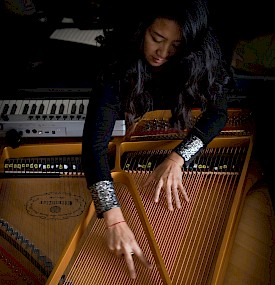
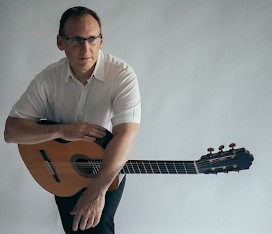 Guitarist Dan Lippel, called a "modern guitar polymath (Guitar Review)" and an "exciting soloist" (NY Times) is active as a soloist, chamber musician, and recording artist. He has been the guitarist for the International Contemporary Ensemble (ICE) since 2005 and new music quartet Flexible Music since 2003. Recent performance highlights include recitals at Sinus Ton Festival (Germany), University of Texas at San Antonio, MOCA Cleveland, Center for New Music in San Francisco, and chamber performances at the Macau Music Festival (China), Sibelius Academy (Finland), Cologne's Acht Brücken Festival (Germany), and the Mostly Mozart Festival at Lincoln Center. He has appeared as a guest with the St. Paul Chamber Orchestra and New York New Music Ensemble, among others, and recorded for Kairos, Bridge, Albany, Starkland, Centaur, and Fat Cat.
Guitarist Dan Lippel, called a "modern guitar polymath (Guitar Review)" and an "exciting soloist" (NY Times) is active as a soloist, chamber musician, and recording artist. He has been the guitarist for the International Contemporary Ensemble (ICE) since 2005 and new music quartet Flexible Music since 2003. Recent performance highlights include recitals at Sinus Ton Festival (Germany), University of Texas at San Antonio, MOCA Cleveland, Center for New Music in San Francisco, and chamber performances at the Macau Music Festival (China), Sibelius Academy (Finland), Cologne's Acht Brücken Festival (Germany), and the Mostly Mozart Festival at Lincoln Center. He has appeared as a guest with the St. Paul Chamber Orchestra and New York New Music Ensemble, among others, and recorded for Kairos, Bridge, Albany, Starkland, Centaur, and Fat Cat.
Recently called “a fearless, visionary, and tremendously talented artist” (Sequenza21) and “a poetic soloist with a strong personality, yet unpretentious” (Die Presse, Vienna), Miranda Cuckson delights audiences with her playing of a great range of music and styles, from older eras to the newest creations. An internationally acclaimed soloist and collaborator, violinist and violist, she enjoys performing at venues large and small, from concert halls to casual spaces.
She has been a featured artist at the Berlin Philharmonie, Suntory Hall, Casa da Musica Porto, Teatro Colón, Cleveland Museum, Art Institute of Chicago, San Francisco’s Herbst Theater, St. Paul Chamber Orchestra’s Liquid Music, the 92nd St Y, National Sawdust, and the Ojai, Bard, Marlboro, Portland, Music Mountain, West Cork, Grafenegg, Wien Modern, Frequency, and LeGuessWho festivals. Miranda made her Carnegie Hall debut playing Piston’s Concerto No. 1 with the American Symphony Orchestra. She recently premiered Georg Friedrich Haas’ Violin Concerto No. 2 at the Vienna Musikverein and with orchestras in Japan, Portugal and Germany, and the Violin Concerto by Marcela Rodriguez with the Orquesta Sinfónica Nacional de México. Miranda is a member of interdisciplinary collective AMOC and director of non-profit Nunc. She has guest curated at National Sawdust and programmed concerts at the Contempo series in Chicago and Miller Theatre in New York, among others. Her numerous lauded albums include Világ, featuring the Bartok Sonata for Solo Violin with contemporary works; the Ligeti, Korngold, Ponce, and Piston concertos; music by 20th century American composers; Bartók/Schnittke/Lutoslawski sonatas; Melting the Darkness, an album of microtonal/electronic music; and Nono’s La lontananza nostalgica utopica futura, named a Recording of the Year by The New York Times. An alumna of The Juilliard School, where she earned her doctorate, she teaches at Mannes College/New School University.
http://www.mirandacuckson.com/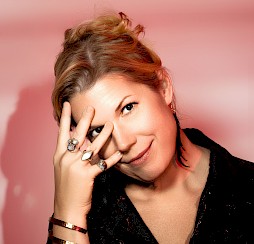
With playing that is “fierce and lyrical” and works that are “other-worldly” (The Strad) and “evocative” (The New York Times), Jessica Meyer is an award-winning composer and violist whose passionate musicianship radiates accessibility and emotional clarity. Meyer’s compositions viscerally explore the wide palette of emotionally expressive colors available to each instrument while using traditional and extended techniques inspired by her varied experiences as a contemporary and period instrumentalist. Since embarking on her composition career at the age of 40, premieres have included performances by GRAMMY-winning vocal ensembles Roomful of Teeth and Vox Clamantis, the St. Lawrence String Quartet as the composer in residence at Spoleto Festival USA, the American Brass Quintet, PUBLIQuartet, Sybarite 5, NOVUS NY of Trinity Wall Street, a work for A Far Cry commissioned by the Isabella Stewart Gardner Museum in Boston, the Juilliard School for a project with the Historical Performance Program, and by the Lorelei Ensemble for a song cycle that received the Dale Warland Singers Commission Award from Chorus America. She has also received multiple commissioning awards from both Chamber Music America and the New York State Council on the Arts.
Her first Symphonic Band piece was commissioned and toured by “The President’s Own” United States Marine Band (with a sold-out NY premiere in Carnegie Hall) and was a finalist for the William D. Revelli Composition Contest. Her orchestral works have been performed by the Phoenix, North Carolina, Charlotte, and Vermont Symphonies, the Nu Deco Ensemble in Miami, at Tanglewood in Seiji Ozawa Hall, and all around the country as part of Carnegie Hall’s nationwide Link Up Program. She was the winner of the 2nd Annual Ellis-Beauregard Foundation Composer’s Award to write a piece for the Bangor Symphony, and a winner of Chamber Music America’s Commissioning Program Award to write for the Argus Quartet. Recent premieres included works for the Dorian Wind Quintet, Hausmann Quartet, Hub New Music, the Portland Youth Philharmonic in collaboration with the female vocal ensemble In Mulieribus, and her viola concerto GAEA that she premiered alongside the Orchestra of the League of Composers at Miller Theatre in NYC. Upcoming premieres include works for the Bronx Arts Ensemble, the Brooklyn Art Song Society, the American Guild of Organists for their National 2024 Conference, and a new orchestral piece to be premiered by a consortium of orchestras across the United States. At home with many different styles of music, Jessica can regularly be seen as a soloist, premiering her chamber works, performing on Baroque viola, improvising with jazz musicians, or collaborating with other composer-performers. In 2023, she joined both the Viola and Chamber Music Faculty of the Manhattan School of Music.
https://jessicameyermusic.com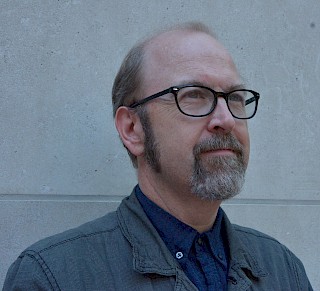 Douglas Boyce writes chamber music that draws on Renaissance traditions and modernist aesthetics, building rich rhythmic structures that shift between order, fragmentation, elegance, and ferocity. Regarding A Book of Songs (2006, in process), the Washington Post wrote “[they] can only be described as drop-dead beautiful. Easily the most captivating works on the program, these songs of love and death are extraordinarily well written and insightful.” Regarding La Déploration, (2016) Corinna da Fonseca-Wollheim wrote that "...the violinist, cellist... and clarinetist... spread out throughout the crypt. Against vaporous harmonics and ghostly fragments of Renaissance music played by the strings, [a] warm, clear clarinet announced itself as very much alive as it sashayed in and out of blues territory and laughed in the face of their mournful keening.”
Douglas Boyce writes chamber music that draws on Renaissance traditions and modernist aesthetics, building rich rhythmic structures that shift between order, fragmentation, elegance, and ferocity. Regarding A Book of Songs (2006, in process), the Washington Post wrote “[they] can only be described as drop-dead beautiful. Easily the most captivating works on the program, these songs of love and death are extraordinarily well written and insightful.” Regarding La Déploration, (2016) Corinna da Fonseca-Wollheim wrote that "...the violinist, cellist... and clarinetist... spread out throughout the crypt. Against vaporous harmonics and ghostly fragments of Renaissance music played by the strings, [a] warm, clear clarinet announced itself as very much alive as it sashayed in and out of blues territory and laughed in the face of their mournful keening.”
 Kyle Bartlett was born in Los Angeles and grew up in rural Arkansas. She is a founding member of the esteemed new music collective counter)induction, and many of her major works have been written for the ensemble. In addition to c)i, most recently her music has been performed by the Prism Saxophone Quartet (US), Oerknal (NL) and E-MEX (DE).
Kyle Bartlett was born in Los Angeles and grew up in rural Arkansas. She is a founding member of the esteemed new music collective counter)induction, and many of her major works have been written for the ensemble. In addition to c)i, most recently her music has been performed by the Prism Saxophone Quartet (US), Oerknal (NL) and E-MEX (DE).
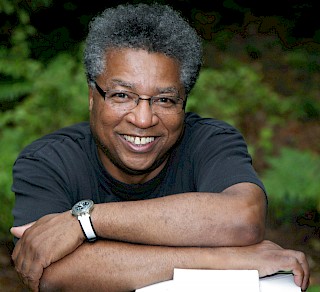 ALVIN SINGLETON was born in Brooklyn, New York, and has served as Composer-in-Residence with the Atlanta Symphony Orchestra, UNISYS Composer-in-Residence with the Detroit Symphony Orchestra, and Visiting Professor of Composition at the Yale University School of Music. Among numerous awards, he was the recipient of a 2003 Guggenheim Fellowship and was commissioned by The Serge Koussevitsky Music Foundation and American Composers Orchestra for the orchestral work When Given a Choice, which premiered at Carnegie Hall in April 2004. His music is recorded on the Albany Records, Elektra/Nonesuch, First Edition Tzadik, and Innova label.
ALVIN SINGLETON was born in Brooklyn, New York, and has served as Composer-in-Residence with the Atlanta Symphony Orchestra, UNISYS Composer-in-Residence with the Detroit Symphony Orchestra, and Visiting Professor of Composition at the Yale University School of Music. Among numerous awards, he was the recipient of a 2003 Guggenheim Fellowship and was commissioned by The Serge Koussevitsky Music Foundation and American Composers Orchestra for the orchestral work When Given a Choice, which premiered at Carnegie Hall in April 2004. His music is recorded on the Albany Records, Elektra/Nonesuch, First Edition Tzadik, and Innova label.
Ryan Streber is a composer and audio engineer based in New York City whose works have been performed in the United States and abroad by artists and ensembles such as The American Composers Orchestra, The Lucerne Percussion Group, The Juilliard Orchestra, The New Juilliard Ensemble, Flexible Music, Line C3 Percussion Quartet, ACME, Boston Conservatory, Gemini Youth Orchestra, Fountain Chamber Ensemble, and many others. His most orchestral work, Arcuare, was read by The ACO in its 2007 Underwood New Music Readings. Other recent works include Shadow Etudes for counter)induction, the string quartet Repexus II commissioned and premiered by ACME, solo pieces for guitarist Daniel Lippel, percussionist Haruka Fujii, and cellist Sumire Kudo, as well as ensemble compositions for the Boston Conservatory Saxophone Ensemble and BoCo Wind Ensemble, Bacchae Fragments for 12 percussionists which was commissioned by the Lucerne Festival Academy's percussion ensemble, and the new music collective counter)induction of which he is a member.
Besides composing concert music, Ryan has scored two short films, designed sound for over a dozen theatrical productions in and around New York, played electric guitar and percussion in bands, and collaborated with other artists in music and multi-media performances and recordings ranging from pop and rock to experimental and jazz.
As an audio engineer and producer, Ryan co-owns and operates Oktaven Audio in Yonkers, NY. He has worked with numerous artists and ensembles on hundreds of live and studio recording projects, including CDs released on the New Focus, Kairos, Tzadik, Naxos, New Amsterdam, Mode, Innova,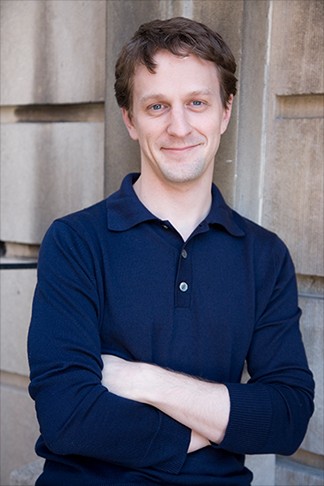
Hot Cup, Albany, Carrier, CAG, New Dynamic, Bridge, GM, Rune, Centaur, Neuma, Capstone, and Arabesque labels.
Ryan received his BMA with Distinction and MMA from The Juilliard School, studying composition with Christopher Rouse and Milton Babbitt. He served as the director of Juilliard's Composers Forum and coordinator for the composition department from 2005 to 2012, and he has also taught composition in the school's Evening Division. He is a recipient of the ASCAP Morton Gould award and Juilliard's Palmer Dixon prize.
Born in 1979 in Rochester, NY, Ryan currently resides in Yonkers, NY.
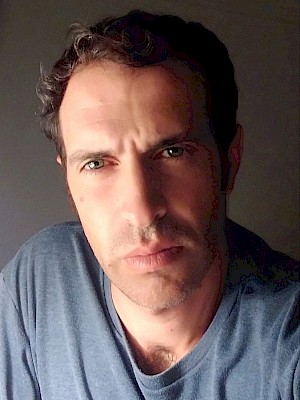 Born in Buenos Aires and initially self-taught, Diego Tedesco went on to formally study piano, violin, guitar and music theory. He studied composition with Julio Viera and Francisco Kröpfl. He gained recognition as a composer in 2007 when he was awarded the first prize at the Juan Carlos Paz competition and he has received numerous commissions and won a grant from Argentina’s National Endowment for the Arts in 2011. He attended the Composers Conference at Wellesley College in 2014 and in the same year won the second place in the most important prize in his country, the “National Award” for Symphonic and Chamber music. In 2016 was premiered his first opera, El Fiord, commissioned by the Teatro Colón of Buenos Aires. In 2017 he was awarded the Koussevitzky Foundation music award.
Born in Buenos Aires and initially self-taught, Diego Tedesco went on to formally study piano, violin, guitar and music theory. He studied composition with Julio Viera and Francisco Kröpfl. He gained recognition as a composer in 2007 when he was awarded the first prize at the Juan Carlos Paz competition and he has received numerous commissions and won a grant from Argentina’s National Endowment for the Arts in 2011. He attended the Composers Conference at Wellesley College in 2014 and in the same year won the second place in the most important prize in his country, the “National Award” for Symphonic and Chamber music. In 2016 was premiered his first opera, El Fiord, commissioned by the Teatro Colón of Buenos Aires. In 2017 he was awarded the Koussevitzky Foundation music award.
The chamber ensemble known as counter)induction is celebrating its 20th anniversary with an album titled Against Method, which is scheduled for release on Friday. Though focused on experimental repertoire, the group isn’t beholden to any single trend line in contemporary American classical style. Pieces by the band’s artistic directors, Douglas Boyce and Kyle Bartlett, open the set and give a sense of the variation to come.
Boyce’s opus, The Hunt by Night, has a gamboling quality, derived from jaunty interplay between piano, cello and clarinet. Bartlett’s Before vaults from whispery timbres to percussive outbursts. Elsewhere, the composer Alvin Singleton — a distinguished elder whose works are too rarely heard in mainstream concert halls — finally gets a premiere recording of a 1997 composition, Ein Kleines Volkslied.
The Mozart reference aside, Singleton’s item is best appreciated as a part of his consistently striking catalog. In the second minute, entertaining handoffs between the electric guitar and bass clarinet prepare the listener for subsequent pairings (as with the vibraphone and piano, heard together in the third minute). The ensemble’s lineup adds a few guest players here to meet the composer’s instrumental requirements. Whether taking on Singleton’s crisp, songful cries or his denser hazes, this retinue handles the composer’s quick-changing music with grace.
— Seth Colter Walls, 11.05.2020
Against Method is a 20th-anniversary celebration from New York-based new music collective counter)induction that features works by its four member composers—Kyle Bartlett, Douglas Boyce, Jessica Meyer, and Ryan Streber—alongside premiere recordings of music by Diego Tedesco and Alvin Singleton. The aim, so the sleeve notes tell us, is to "capture the fundamental subversion a the core of the ensemble's ethos—the prioritization of substance over fashion, despite the existential pressures on a group of its kind in our contemporary landscape." That may not sound like a recipe for easy listening, but those inclined will find music of considerable integrity and plenty of craft.
They open with Boyce's addictive The Hunt by Night, a syncopated, 12-minute gallop for piano, cello, and clarinet. Bartlett's Before follows, a wrenching, extruded piece for clarinet, guitar, and percussion that feels more experimental, certainly more elusive. Meyer's rather static Forgiveness for clarinet and loop pedal is of less interest than Streber's jittery, bleak-hued Piano Quartet, a work full interest and imaginative writing for all four instruments. Of the "guest composers," Singleton's Ein Kleines Volkslied is full of deft touches combining piano, cello, and bass with soulful electric guitar, mellow clarinet licks, and shimmering vibraphone. Singleton has a reputation for frosty, cerebral music, which this attractively edgy score certainly is not. The eight players carry all before them, but if proof were still needed, Tedesco's prickly Scherzo offers a virtuoso showcase to cap an hour of new music worth taking your time over.
— Clive Paget, 2.03.2021
Chamber ensemble/composer collective counter)induction celebrates twenty years together with the recording Against Method. It consists of pieces contributed by composers associated with the collective as well those by “guest composers.” counter)induction has distinguished itself with a versatile approach to new music, selecting works with a keen eye toward musicality and a clear resistance to stylistic dogma. Against Method neatly encapsulates this approach.
Douglas Boyce’s Hunt by Night is an ostinato filled trio at a propulsive tempo for clarinet, cello, and piano. The piece also features glissandos and blurred microtonal inflections that offset the repeated pitches and chords nicely. Before, by Kyle Bartlett, is another trio, this time for clarinet, cello, and guitar. Wisps of texture are succeeded by noisy angularity with scratch tone effects. The unity provided by shared effects makes this broken consort sound at times like a single instrument. The sound spectrum moves between noise and dissonant counterpoint to create formal boundaries. Further along, the trio breaks up into characterful solos, notably a lithe cadenza by guitarist Daniel Lippel, which concludes the work.
Lippel switches to electric guitar, accompanied by clarinetist Benjamin Fingland, vibraphonist Jeffrey Irving, cellist Caleb van der Swaagh, pianist Renate Rolfing, and bassist Randall Zigler in Alvin Singleton’s Ein Kleines Volkslied. Rock-inspired chord progressions are played on the guitar, tremolando strings are emphatically rendered at key points alongside bluesy clarinet riffs, pizzicato bass, and jazz-inflected vibraphone arpeggiations. A bustling section overlaps these various playing styles, cut off again and again by tremolandos only to reassert itself. Bass clarinet, guitar, and vibes take over, their parts fragmenting the motives found in the beginning of the piece. Finally, a pileup of all the various elements creates a contrapuntal conclusion. Fingland plays Jessica Meyer’s Forgiveness, in which a loop pedal plays a prominent role. Air through the mouthpiece begins the piece followed by sustained pitches, all of which the loop pedal allows to overlap into clustered textures and tight counterpoint. Looping has become a favorite of new music composers, but Meyer distinguishes her piece with an organic approach to the sounds of playing and a fine ear for the pitch relationships that result in overlapping.
Ryan Streber’s Piano Quartet is the most formidable composition on Against Method. The various instruments move at different rates, creating a Carterian sense of time flow. Streber also has a finely attuned ear for the selection and spacing of post-tonal harmonies. The linear component, with a number of imitative passages, is also finely wrought. The ensemble comprehensively knows the piece, delivering a performance that is assured and engaging throughout.
The recording concludes with Scherzo by Diego Tedesco, a piece filled with descending chromatic scales that provide a jocular motive that appears in countless contexts throughout the piece. Tedesco blends pizzicatos from guitar and strings to good effect, followed by the aforementioned glissandos in cascading overlaps of sound. Particularly affecting is the middle section, which is an “eye of the storm” where the piece’s motives are fragmented and delicately hued. Clarinet and guitar are given an extended duet that is followed by an eruptive passage in the strings. Pizzicato and glissandos succeed in turn to create a clear juxtaposition of playing styles, at key points blending to create transitions between sections. Tight dissonances between violin and clarinet ratchet up the tension, which is finally allowed release in a sustained note from the clarinet followed by violin multi-stops. Scherzo is well- constructed, devised to show counter)induction to their best advantage. Top to bottom, Against Method is a stirring listen.
— Christian Carey, 11.05.2020
Born in a confluence of University of Pennsylvania composers and Juilliard School performers – and endowed with a name that strikes fear into the hearts of copy editors everywhere – counter)induction celebrates its 20th anniversary with a collection that shows the its creative potency and range. Four composer members offer a range of sharply contrasted yet complementary pieces, the program is rounded out with pieces well worth hearing by Alvin Singleton and Diego Tedesco, and everything is played with expertise and charisma.
— Steve Smith: For the Record, 11.06.2020
The chamber ensemble counter)induction, a group that has dedicated itself to the performance of new music since it came on the scene at the end of the last century, takes its name from a concept in philosopher Paul Feyerabend’s classic work Against Method, which is also the title of their latest album. counter)induction, roughly, is a critical method of opposing a theory or concept with a counterpart drawn from outside of the target theory’s ordinary frame of reference. In practical terms it entails an embrace of critical pluralism, which seems to have been the concrete inspiration counter)induction took from it. With its selection of six diverse works by just as many composers, Against Method the album neatly encapsulates the group’s musical pluralism.
The opening track, Douglas Boyce’s The Hunt by Night, is a trio for clarinet, cello, and piano that uncoils with a spry, loping energy that recalls the spirit of Les Six. It’s an engaging lead-in, and oddly, perhaps the least “contemporary” sounding of the works represented. Kyle Bartlett’s Before for guitar, bass clarinet and cello follows and changes the atmosphere dramatically. In contrast to The Hunt by Night’s melodic continuity, Before features bursts of fragmentary lines and long tones, and makes generous use of unpitched sounds. Ein Kleines Volkslied by Alvin Singleton, originally commissioned by Bang on a Can, draws on elements of rock and jazz—Dan Lippel’s distorted electric guitar chords and Randall Zigler’s pizzicato basslines add just the right flavor—and includes a fine feature for vibraphone at its center. Jessica Meyer’s Forgiveness, the only piece on the album incorporating electronics, uses a loop pedal to transform a hymn-like solo performance by bass clarinetist Benjamin Fingland into an accumulating, virtual reed ensemble. In another abrupt contrast of styles, Forgiveness is followed by Ryan Streber’s neoclassical Piano Quartet—a lushly beautiful, harmonically rich piece. The album closes with Argentinian composer Diego Tedesco’s Scherzo for guitar, clarinet, violin, viola, and cello. Although billed as a musical joke—and the repeated motif of descending chromatic lines does sound like a bagful of broken toys falling down a flight of stairs—the piece makes sophisticated use of pizzicato textures from the guitar and other strings.
— Daniel Barbiero, 11.23.2020
There are times when after playing an album, repeatedly, you don’t actually know what to write about it. When listening to the latest counter)induction album Against Method this is exactly what happened. My head was filled with a vibrant piece of contemporary chamber music, but the ultimate takeaway was that this is a great album, filled with intoxicating melodies, clever motifs, and the kind of playing that leaves your jaw ajar.
From the opening moments of The Hunt by Night, you get the impression that this will be a jocular affair. And this is true. The Hunt by Night is a delirious piece of music. It bounces about with a smile on its face. The interplay between the piano and clarinet is joyous. Then a lull hits and there is a melancholic underpinning and things become more serious. As this is a song about hunting at night a level of seriousness was always going to come into play, but when BAM the hunt is on again and the playing is fast and merry. Before slows things down a bit. The merry bounce is still there but there is a brooding intensity just bubbling below the surface creating something incredibly tactile. The standout track on the album is Scherzo. Written by Argentine composer Diego Tedesco, Scherzo features clarinet, guitar, violin, viola, and cello and was written for the ensemble. It allows interrelationships between the instruments and players. These interactions show us how unique and delightful chamber music can still be.
At times it is the players who are the centre of the album and now what they are actually playing. Benjamin Fingland’s clarinet is a sheer delight. Caleb van der Swaagh’s cello is the backbone of the compositions when he appears. Daniel Lippel’s guitar is understated but devastating. If you removed Jeffrey Irving’s vibraphone from Ein Kleines Volkslied it wouldn’t have the power, or enjoyment, that it does. Renate Rohlfing’s piano is airy but strong like a great dancer. Randall Zigler’s bass is majestic. Miranda Cuckson’s violin is, pretty much, everything I could have hoped for as is Jessica Meyer’s viola.
After 20-years counter)induction are still capable of playing incredible delicate but powerful music. As Against Method shows. It also shows an ensemble that is at the top of their game and has musical bravery that is to be commended. So, it turns out I did have plenty to say about this after all. Much like the quality of this album. Was it ever in doubt?
— Nick Roseblade, 12.23.2020
With players like Miranda Cuckson (violin), Benjamin Fingland (clarinet), Dan Lippel (guitar), Jessica Meyer (viola), Caleb van der Swaagh (cello), and Ning Yu (piano), there is no hype in calling this ensemble a supergroup. In celebrating their 20th anniversary, they've assembled a collection that plays to all of their strengths - from an interest in instrumental interaction, as in The Hunt By Night (2020), the charming Douglas Boyce trio that opens the album, to cutting-edge practices, as in Meyer's own Forgiveness (2016) for bass clarinet and loop pedal, a deceptively quiet exploration into uncomfortable emotions. The performances are all excellent, the sound is warm yet crisp, and the whole album satisfies far beyond its commemorative purpose. Here's to another 20 years!
— Jeremy Shatan, 12.26.2020
One of the neat things about this group of contemporary classical musicians as they celebrate their 20th anniversary is their progressive attitude that never gives in to art for preciousness sake. Sounding more like they draw inspiration from late 50s Bernstein composing for Broadway than they do from pots and pans music, they bring ample professionalism and craft to these commissioned works that seek out things hiding in nooks and crannies as well as in plain sight. Playing with a passion that comes from that good place, this crew takes you on some wonderful flights of fancy here as they kick off a new decade together.
— Chris Spector, 10.30.2020
The long running New York new music ensemble counter)induction bring us 2 decades worth of experience to these 6 creative selections.
Douglas Boyce’s The Hunt By Night opens the listen with Benjamin Fingland’s bright clarinet and Ning Yu’s lively piano making for a careful yet frisky delivery, and Before, by Kyle Bartlett, follows with strong attention to space, where Caleb van der Swaagh’s cello manipulation suits the distinct atmosphere.
The middle belongs to Alvin Singleton’s Ein Kleines Volkslied and Jessica Meyer’s Forgiveness. The former utilizes Meyer’s quivering viola amid Jeffrey Irving’s dreamy vibraphone, while the latter provides for a rich experience via the looper pedal and strong tonality that illuminates Fingland’s clarinet.
Diego Tedesco’s Scherzo exits the listen, and it meshes clarinet, guitar, violin, viola, and cello with a rare texturing that’s intimate and adventurous.
An iconoclastic version of chamber sounds that are colorful and unpredictable, the artistic and modern techniques are much appreciated, too.
— Tom Haugen, 1.19.2025